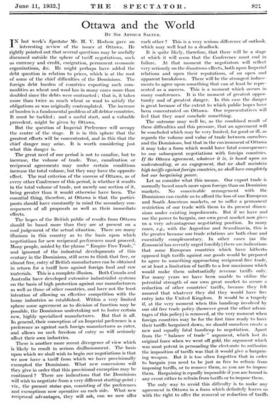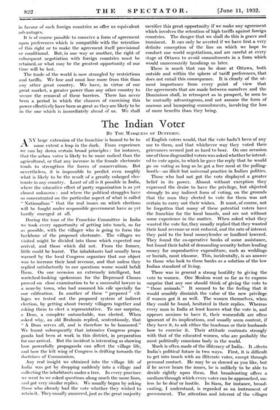Ottawa and the World
By SIR ARTHUR SALTER.
IN last Week's Spectator Mr. H. V. Hodson gave an interesting review of the issues at Ottawa. He rightly Pointed out that several questions may be usefully discussed outside the sphere of tariff negotiations, such as currency and Credit, emigration, permanent economic organizations, &c. He might perhaps have added the debt question in relation to prices, which is at the root of some of the chief difficulties of the Dominions. The foreign debt burden of countries exporting such com- modities as wheat and wool has in many cases more than doubled since the debts were contracted ; that is, it takes more than twice as much wheat or wool to satisfy the obligations as was Originally contemplated. The increase of burden is a fundamental problem of all debtor countries. It must be tackled ; and a useful start, and a valuable precedent, might be given by Ottawa.
But the question of Imperial Preference will occupy the centre of the stage. It is in this Sphere that the -greatest efforts will be concentrated, and in this that the 'chief danger may arise. It is worth considering just what this danger is.
The great need of our period is not to canalize, but to increase, the volume of trade. True, canalization or 'reciprocal agreements may under certain conditions increase the total volume, but they may have the opposite effect. The real criterion of the success of Ottawa, as of every other Conference of this period, is whether it results in the total volume of trade, not merely one section of it, being greater than it would otherwise have been. The essential thing, therefore, at Ottawa is that the partici- pants should have constantly in mind the secondary con- sequences of all proposals as well as their immediate effects.
The hopes of the British public of results from Ottawa should be based more than they arc at present on a cool judgement of the actual situation. There are many illusions in this country as to the basis upon which negotiations for new reciprocal preferences must proceed. Many people, misled by the phrase" Empire Free Trade," and ignorant of the industrial developments of this century in the Dominions, still seem to think that free, or almost free, entry of British manufactures can be obtained in return for a tariff here against foreign food and raw 'materials. This is a complete illusion. Both Canada and Australia have developed extensive industrialist systems on the basis of high protection against our manufacturers as well as those of other countries, and have not the least • intention of allowing us effective competition with the home industries so established. Within a very limited sphere some agreement as to division of function may be possible, the Dominions undertaking not to foster certain new, highly specialized manufactures. But that is all. In general, their conception of an Imperial preference is a preference asagainst such foreign manufactures as enter, and allows no such freedom of entry as will seriously affect their own industries.
There is another more recent divergence of view which is likely to result in serious disillusionment. The basis upon which we shall wish to begin our negotiations is that we now have a tariff from which we have provisionally exempted the Dominions. What new concessions will they give in order that this provisional exemption may be continued ? There are indications that the Dominions will wish to negotiate from a very different starting-point ; viz., the present status quo, consisting of the preferences and exemptions now operative on each side. What new reciprocal advantages, they will ask, can we now offer each other ? This is a very serious difference of outlook, which may well lead to a deadlock.
It is quite likely, therefore, that there will be a stage at which it will seem that the Conference must end in failure. At that moment the negotiators will reflect very seriously on the disastrous effects, both upon Imperial relations and upon their reputations, of an open and apparent breakdown. There will be the strongest induce- ments to agree upon something that can at least be repre- sented as a success. This is a moment which occurs in many conferences. It is the moment of greatest oppor- tunity and of greatest danger. In this case the danger is great because of the extent to which public hopes have been concentrated on Ottawa. Our representatives will feel that they must conclude something.
The outcome may well be, as the combined result of these difficulties and this pressure, that an agreement will be concluded which may be very limited, for good or ill, as regards the volume and value of trade between ourselves and the Dominions, but that in the environment of Ottawa it may take a form which would have fatal consequences to our subsequent negotiations with foreign countries. If the Ottawa agreement, whatever it is, is based upon an understanding, or an engagement, that we shall maintain high tartffs against foreign countries, we shall have completely lost our bargaining power.
Let us consider what this means. Our export trade is normally based much more upon foreign than on Dominion markets. No conceivable arrangement with the Dominions can enable us to afford the loss of our European and South American markets, or to suffer a permanent restriction of our trade with them to its present dimen- sions under existing impediments. But if we have and use the power to bargain, our own great market now gives us a very advantageous negotiating position. In many cases, e.g., with the Argentine and Scandinavia, this is the greater because our trade relations are both close and essentially complementary. In other cases (as the Economist has recently urged forcibly) there arc indications that some European countries which have hitherto opposed high tariffs against our goods would be prepared to agree to something approaching reciprocal free trade, or at least a limitation of tariffs to a low maximum which would make them substantially revenue tariffs only. For many years we have been unable to utilize the potential strength of our own great market to secure a reduction of other countries' tariffs, because they felt assured that whatever they did they would have free entry into the United Kingdom. It would be a tragedy if, at the very moment when this handicap involved by our old free trade policy (however great the other a(lvan- tages of this policy) is removed, at the very moment when foreign countries may be for the first time ready to have their tariffs bargained down, we should ourselves create a new and equally fatal handicap to negotiation. Apart from the "balance of trade" argument, which lost its original force when we went off gold, the argument which was most potent in persuading the electorate to authorize the imposition of tariffs was that it would give a bargain- ing weapon. But it is too often forgotten that in order to bargain you need to be just as free to refrain from imposing tariffs, or to remove them, as you are to impose them. Bargaining is equally impossible if you are bound in any event either to refrain from tariffs or to impose them.
The only way to avoid this difficulty is to make any agreement in Ottawa in a form which definitely leaves us with the right to offer the removal or reduction of tariffs in favour of such foreign countries as offer us equivalent advantages.
It is of course possible to conceive a form of agreement upon preferences which is compatible with the retention of this right or to make the agreement itself provisional or conditional. But, in one way or another, the right of subsequent negotiation with foreign countries must be retained, or what may be the greatest opportunity of our time will be lost.
The trade of the world is now strangled by restrictions and tariffs. We lose and must lose more from this than any other great country. We have, in virtue of our great market, a greater power than any other country to secure the removal of these barriers. There has never been a period in which the chances of exercising this power effectively have been so great as they are likely to be in the one which is immediately ahead of us. We shall sacrifice this great opportunity if we make any agreement which involves the retention of high tariffs against foreign countries. The danger that we shall do this is grave and imminent. It can only be averted if we have first a very definite conception of the line on which we hope to conduct our world negotiations, and are careful at every stage at Ottawa to avoid commitments in a form which would unnecessarily handicap us later.
Where is much that can be done at Ottawa, both outside and within the sphere of tariff preferences, that does not entail this consequence. It is clearly of the ut- most importance from every point of view that the agreements that are made between ourselves and the Dominions shall, in retrospect as in prospect, be seen to be mutually advantageous, and not assume the form of onerous and hampering commitments, involving the loss of more benefits than they bring.



































 Previous page
Previous page